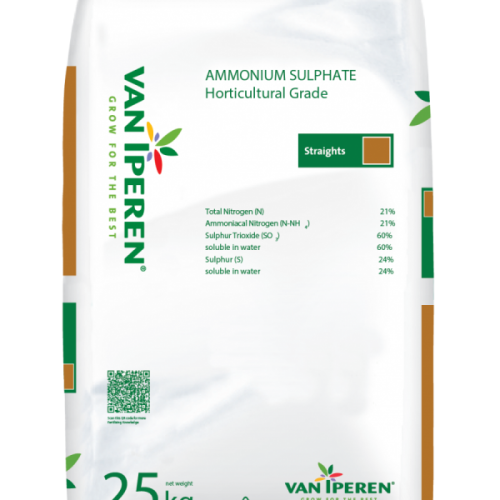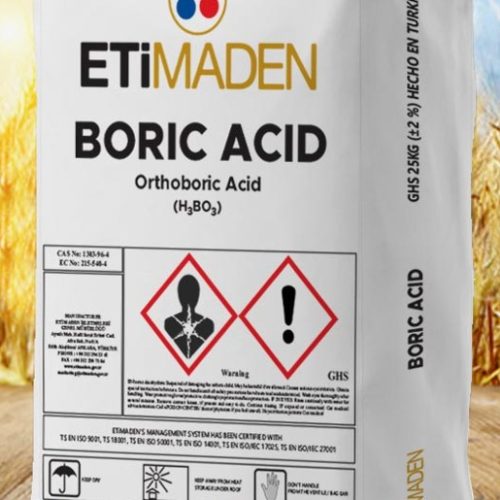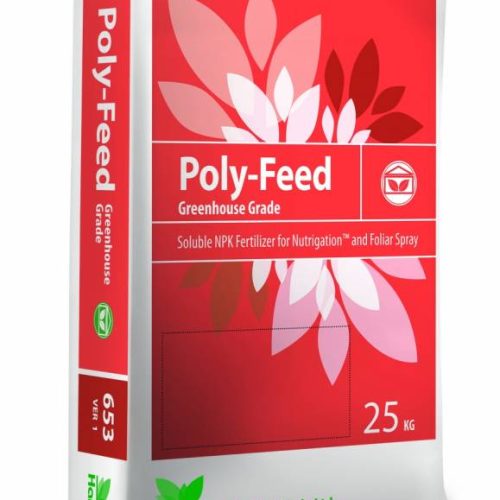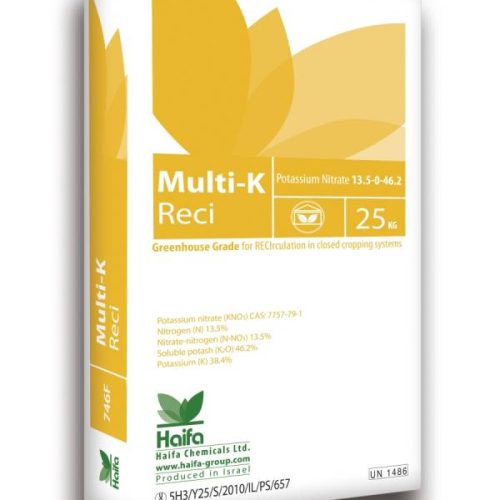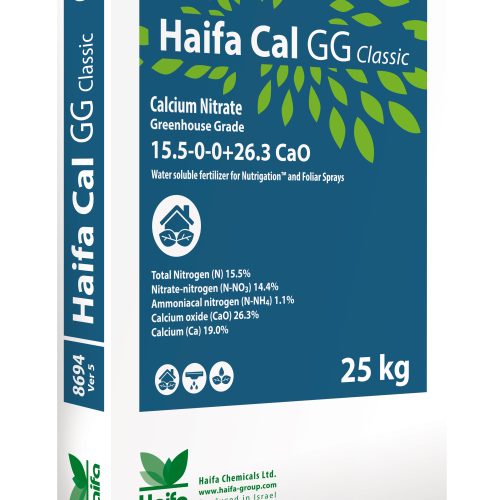-
FIELD OF APPLICATION Ammonium sulphate is used in nutrient solutions to supply the plant nutrients nitrogen and sulphur. It is mainly used for plant species that thrive at low pH values, especially blueberries. Ammonium sulphate has an acidifying effect on the soil water as the plant and/or soil colloids take up the ammonium ions and simultaneously release hydrogen ions. WHY SHOULD I USE AMMONIUM SULPHATE Ammonium sulphate is used in fertigation as a plant nutrient source of nitrogen and sulphur to reduce or maintain a low pH in the soil/substrate.Nitrogen is used by the plant in protein synthesis and enzymes. Sulphur is a component of some amino acids and is therefore also important for protein synthesis. Sulphur is also involved in fat synthesis and energy transfer reactions in cells.
-
FIELD OF APPLICATION Boric acid is used for foliar fertilization in outdoor crops and for nutrient irrigation in greenhouses and outdoors.
-
FIELD OF APPLICATION Haifa GrowClean is used to improve phosphorus availability, to keep the lines clean from deposits and at high dose to improve vegetative growth. WHY SHOULD I USE POLYPHOSPHATE? The phosphorus in common fertilizers such as MAP, MKP and phosphoric acid is made up of phosphate ions (in the form of orthophosphate). Phosphate ions readily combine with calcium and magnesium and precipitate as calcium phosphate or magnesium phosphate. Once precipitated, they become unavailable to the plant and we then see lower phosphorus levels in the water analysis. The precipitation can get stuck in the pipes or even cause blockages. High levels of phosphorus and/or high pH values accelerate precipitation. Adding more phosphorus does not help as the precipitation reaction increases at higher levels. The pH of the nutrient solution must be kept below 6.4 to keep phosphorus in solution. Since the introduction of polyphosphate products, many growers have found that low-dose polyphosphate keeps lines clear of deposits and higher doses provide extra vegetative growth to plants. The disadvantage of previous polyphosphate products is that they have a high pH value that needs to be compensated with extra acid. With the introduction of Haifa GrowClean, this disadvantage disappears. Haifa GrowClean is a neutral product and has a very low sodium content.
-
FIELD OF APPLICATION Poly-Feed is used for nutrient solutions in greenhouses, tunnels and outdoors. Solo is suitable for ornamental plants and where vegetative growth is prioritized. Menuet is suitable for foliar spraying of golf greens. Pavane contains a high proportion of potassium and is therefore suitable for potassium-demanding crops with flowering and fruit development, or storage organs such as root/stem tubers. Poly-Feed has an extremely low sodium content and is chlorine-free!
-
FIELD OF APPLICATION Calcium chloride is used in nutrient solutions to supply the plant nutrients calcium and chloride. When nitrogen supply needs to be limited, e.g. at flowering, fruiting and at the end of the growing season, calcium chloride can be used in tomato cultivation to add chloride and increase the calcium content without affecting the nitrogen supply. Chloride is now considered to benefit both the generative growth of tomato plants and the taste of the fruit. WHY SHOULD I USE CALCIUM CHLORIDE Calcium is incorporated into both cell membranes and cell walls and is important for cell stability and resistance to disease. The possibility of replacing some calcium nitrate with calcium chloride improves the taste and quality of the fruit. Chloride is sometimes considered a micronutrient, but in most crops it does not need to be added as sufficient levels are present in soil and water. In tomato cultivation, it should be added for flavor and growth management.
-
FIELD OF APPLICATION Potassium bicarbonate is used for upward pH adjustment in irrigation water and nutrient solutions made from low-calcium water, while providing potassium supplementation.
-
FIELD OF APPLICATION Potassium carbonate is used for upward pH adjustment in irrigation water and nutrient solutions with low pH values, while providing potassium supplementation. Potassium carbonate provides a stable pH value in the solution.
-
FIELD OF APPLICATION Potassium chloride is used in nutrient solutions to supply the plant nutrients potassium and chloride. When nitrogen supply needs to be limited, e.g. at flowering, fruiting and at the end of the growing season, potassium chloride can be used in tomato cultivation to add chloride and increase the potassium content without affecting the nitrogen supply. Chloride is now considered to benefit both the generative growth of tomato plants and the taste of the fruit. WHY SHOULD I USE POTASSIUM CHLORIDE Potassium improves the plant's tolerance to drought, frost, pests and thus increases yields. The ability to control the potassium/nitrogen ratio also allows for a better quality, shelf life and higher sugar content of the plant. Chloride is sometimes considered a micronutrient, but in most crops it does not need to be added as sufficient levels are present in soil and water. In tomato cultivation, it should be added for flavor and for growth management.
-
FIELD OF APPLICATION Multi-K Reci is used in nutrient solutions and is suitable for all crops receiving nutrient irrigation. Can also be used for foliar fertilization. Potassium nitrate contributes to better flowering and fruit development thanks to its high potassium content. The combination of potassium and nitrate results in rapid uptake by the roots. Nitrogen is the plant nutrient most needed by the plant, as it is incorporated into DNA, chlorophyll and amino acids, as well as into enzymes that have many functions in the plant.
-
FIELD OF APPLICATION Potassium Sulphate Haifa SOP Bio is used in nutrient solutions for both irrigation and foliar fertilization to supply the plant nutrients potassium and sulphur. When nitrogen supply needs to be limited, such as during flowering, fruiting and at the end of the growing season, potassium sulphate is an excellent nitrogen-free source of potassium. It also provides valuable sulphur to the crop. WHY SHOULD I USE POTASSIUM SULFATE SOP BIO Potassium improves the plant's tolerance to drought, frost, pests and thus increases yields. The ability to control the potassium/nitrogen ratio also provides the conditions for a better quality, shelf life and higher sugar content in the plant. Sulphur is a component of certain amino acids and is therefore crucial to the plant's ability to produce protein. Sulphur is also involved, for example, in fat production and in energy transfer reactions in cells. The sulphur content of potassium sulphate makes it particularly suitable for crops such as cabbages, onions, sunflowers and others, as they produce sulphur-rich organic compounds as protective substances.
-
FIELD OF APPLICATION Haifa Cal is used for the supply of nitrogen and calcium in nutrient solutions to all plant species both by watering and foliar fertilization. WHY SHOULD I USE HAIFA CAL Calcium nitrate provides calcium which is important for the quality of fruits and improves shelf life. Calcium is incorporated into both cell membranes and cell walls and is important for cell stability and disease resistance. Nitrogen is the plant nutrient most needed by the plant, as it is incorporated into DNA, chlorophyll and all the amino acids needed by the plant for protein synthesis and enzymes that have many functions in the plant. Nitrogen is available in different forms, calcium nitrate contains a small amount of ammonium which helps to counteract unwanted pH increase in the substrate. But nitrogen should not be overdosed. Consider the possibility of replacing part of the calcium nitrate with calcium chloride to give better taste and quality. Used mainly in tomato cultivation. Caution is recommended in other cultures.

